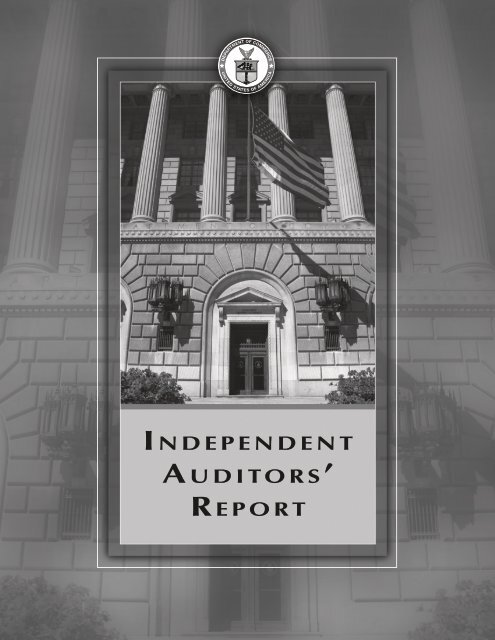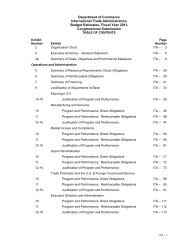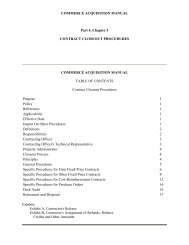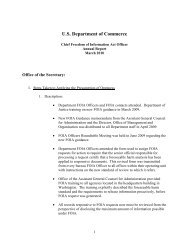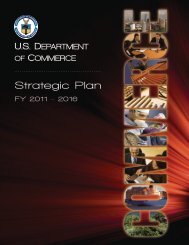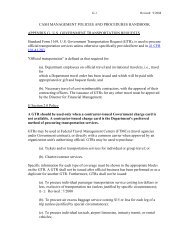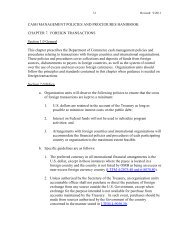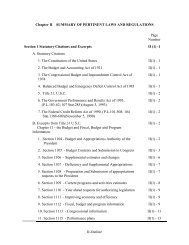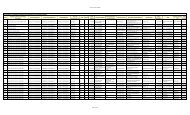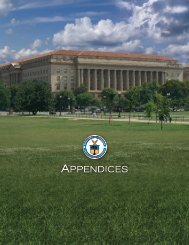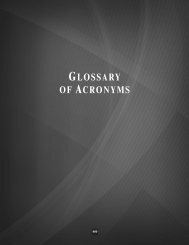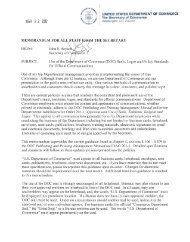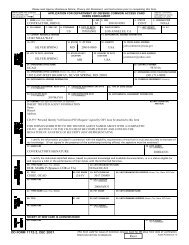INDEPENDENT AUDITORS ' REPORT - Department of Commerce
INDEPENDENT AUDITORS ' REPORT - Department of Commerce
INDEPENDENT AUDITORS ' REPORT - Department of Commerce
Create successful ePaper yourself
Turn your PDF publications into a flip-book with our unique Google optimized e-Paper software.
I n d e p e n d e n tA u d i t o r s ’R e p o r t
Independent Auditors’ ReportNovember 9, 2007MEMORANDUM FOR:Carlos M. GutierrezSecretary <strong>of</strong> <strong>Commerce</strong>FROM:SUBJECT:Elizabeth T. BarlowActing Inspector General<strong>Department</strong> <strong>of</strong> <strong>Commerce</strong>’s FY 2007 Consolidated FinancialStatements, Audit Report No. FSD-18530-8-0002I am pleased to provide you with the attached audit report required by the Chief FinancialOfficers Act <strong>of</strong> 1990, as amended, which presents an unqualified opinion on the <strong>Department</strong> <strong>of</strong><strong>Commerce</strong>’s FY 2007 consolidated financial statements. The audit results indicate that the<strong>Department</strong> has established an internal control structure that facilitates the preparation <strong>of</strong> reliablefinancial and performance information. We commend the <strong>Department</strong> for the noteworthyaccomplishment <strong>of</strong> once again attaining an unqualified opinion—the ninth consecutive year.The independent public accounting firm <strong>of</strong> KPMG LLP performed the audit <strong>of</strong> the <strong>Department</strong>’sfinancial statements for the year ended September 30, 2007. The contract required that the auditbe done in accordance with U.S. generally accepted government auditing standards and Office <strong>of</strong>Management and Budget Bulletin 07-04, Audit Requirements for Federal Financial Statements.In its audit <strong>of</strong> the <strong>Department</strong>, KPMG found that• the financial statements were fairly presented, in all material respects and in conformity withU.S. generally accepted accounting principles;• there was one significant deficiency related to weaknesses in controls over the <strong>Department</strong>’sfinancial management systems (but not considered a material weakness in internal control asdefined in the independent auditors’ report);• there were no instances in which the <strong>Department</strong>’s financial management systems did notsubstantially comply with the requirements <strong>of</strong> the Federal Financial ManagementImprovement Act <strong>of</strong> 1996;• there was one instance in which the <strong>Department</strong> did not comply with other laws andregulations (Anti-Deficiency Act violation at the National Oceanic and AtmosphericAdministration); and• there was one additional concern in which the <strong>Department</strong>’s Office <strong>of</strong> General Counsel isreviewing whether the United States Patent and Trademark Office violated the Anti-Deficiency Act and the Patent and Trademark Fee Fairness Act <strong>of</strong> 1999 during fiscalyear 2005. However, a conclusion has not yet been reached.F Y 2 0 0 7 P E R F O R M A N C E A N D A C C O U N T A B I L I T Y R E P O R T275
Independent Auditors’ ReportThe <strong>Department</strong> implemented corrective actions during FY 2007 to resolve many <strong>of</strong> thepreviously identified information technology control weaknesses and agreements in violation <strong>of</strong>the Anti-Deficiency Act. These actions and management’s expression <strong>of</strong> its intent to resolve theremaining and newly identified weaknesses are evidence <strong>of</strong> the <strong>Department</strong>’s continuedcommitment to sound financial management, effective internal controls, and reliablefinancial/performance information.My <strong>of</strong>fice oversaw the audit performance and delivery. We reviewed KPMG’s report and relateddocumentation and made inquiries <strong>of</strong> its representatives. Our review disclosed no instanceswhere KPMG did not comply, in all material respects, with U.S. generally accepted governmentauditing standards. However, our review cannot be construed as an audit in accordance with U.S.generally accepted government auditing standards. It was not intended to enable us to express,and we do not express, any opinion on the <strong>Department</strong>’s consolidated financial statements,conclusions about the effectiveness <strong>of</strong> internal controls, or conclusions on compliance with laws,regulations, contracts, and grant agreements. KPMG is solely responsible for the attached auditreport dated November 9, 2007, and the conclusions expressed in the report.An audit action plan is not required to address the significant deficiency reported by KPMG.However, we ask that you provide a plan addressing the related specific recommendationsincluded in the separate, limited-distribution information technology general controls report(FSD-18530-8-0001) in accordance with <strong>Department</strong> Administrative Order 213-5.If you wish to discuss the contents <strong>of</strong> this report, please call me on (202) 482-4661, orJohn Seeba, Assistant Inspector General for Auditing, on (202) 482-5910. We appreciate thecooperation and courtesies the <strong>Department</strong> extended to both KPMG and my staff during theaudit.Attachmentcc:Otto J. WolffChief Financial Officer and Assistant Secretary for AdministrationBarry C. WestChief Information OfficerJon W. DudasUnder Secretary <strong>of</strong> <strong>Commerce</strong> for Intellectual Property andDirector <strong>of</strong> the United States Patent and Trademark Office276F Y 2 0 0 7 P E R F O R M A N C E A N D A C C O U N T A B I L I T Y R E P O R T
Independent Auditors’ ReportKPMG LLP2001 M Street, NWWashington, DC 20036<strong>INDEPENDENT</strong> <strong>AUDITORS</strong>’ <strong>REPORT</strong>Acting Inspector General, U.S. <strong>Department</strong> <strong>of</strong> <strong>Commerce</strong> andSecretary, U.S. <strong>Department</strong> <strong>of</strong> <strong>Commerce</strong>:We have audited the accompanying consolidated balance sheets <strong>of</strong> the U.S. <strong>Department</strong><strong>of</strong> <strong>Commerce</strong> (<strong>Department</strong>) as <strong>of</strong> September 30, 2007 and 2006, and the relatedconsolidated statements <strong>of</strong> net cost and changes in net position, and the combinedstatements <strong>of</strong> budgetary resources (hereinafter referred to as consolidated financialstatements) for the years then ended. The objective <strong>of</strong> our audits was to express anopinion on the fair presentation <strong>of</strong> these consolidated financial statements. In connectionwith our fiscal year 2007 audit, we also considered the <strong>Department</strong>’s internal controlsover financial reporting and performance measures and tested the <strong>Department</strong>’scompliance with certain provisions <strong>of</strong> applicable laws, regulations, contracts, and grantagreements that could have a direct and material effect on these consolidated financialstatements.SummaryAs stated in our opinion on the consolidated financial statements, we concluded that the<strong>Department</strong>’s consolidated financial statements as <strong>of</strong> and for the years ended September30, 2007 and 2006, are presented fairly, in all material respects, in conformity with U.S.generally accepted accounting principles.As discussed in our opinion, the <strong>Department</strong> changed its method <strong>of</strong> reporting thereconciliation <strong>of</strong> budgetary resources obligated to the net cost <strong>of</strong> operations in fiscal year2007.Our consideration <strong>of</strong> internal controls over financial reporting resulted in theidentification <strong>of</strong> one significant deficiency related to the weaknesses in the <strong>Department</strong>’sgeneral information technology controls. However, we do not consider this significantdeficiency to be a material weakness.We noted no deficiencies involving the design <strong>of</strong> the internal control over the existenceand completeness assertions related to key performance measures.The results <strong>of</strong> our tests <strong>of</strong> compliance with certain provisions <strong>of</strong> laws, regulations,contracts, and grant agreements disclosed instances <strong>of</strong> noncompliance with the Anti-Deficiency Act that are required to be reported under Government Auditing Standards,issued by the Comptroller General <strong>of</strong> the United States, and Office <strong>of</strong> Management andKPMG LLP, a U.S. limited liability partnership, is the U.S.member firm <strong>of</strong> KPMG International, a Swiss cooperative.F Y 2 0 0 7 P E R F O R M A N C E A N D A C C O U N T A B I L I T Y R E P O R T277
Independent Auditors’ ReportBudget (OMB) Bulletin No. 07-04, Audit Requirements for Federal FinancialStatements.The following sections discuss our opinion on the <strong>Department</strong>’s consolidated financialstatements; our consideration <strong>of</strong> the <strong>Department</strong>’s internal controls over financialreporting and performance measures; our tests <strong>of</strong> the <strong>Department</strong>’s compliance withcertain provisions <strong>of</strong> applicable laws, regulations, contracts, and grant agreements; andmanagement’s and our responsibilities.Opinion on the Consolidated Financial StatementsWe have audited the accompanying consolidated balance sheets <strong>of</strong> the U.S. <strong>Department</strong><strong>of</strong> <strong>Commerce</strong> as <strong>of</strong> September 30, 2007 and 2006, and the related consolidatedstatements <strong>of</strong> net cost and changes in net position, and the combined statements <strong>of</strong>budgetary resources for the years then ended.In our opinion, the consolidated financial statements referred to above present fairly, inall material respects, the financial position <strong>of</strong> the <strong>Department</strong> as <strong>of</strong> September 30, 2007and 2006, and its net costs, changes in net position, and budgetary resources for the yearsthen ended, in conformity with U.S. generally accepted accounting principles.As discussed in Note 21 to the consolidated financial statements, the <strong>Department</strong> changedits method <strong>of</strong> reporting the reconciliation <strong>of</strong> budgetary resources obligated to the net cost<strong>of</strong> operations in fiscal year 2007, based on new reporting requirements under OMBCircular No. A-136.The information in the Management Discussion and Analysis, Required SupplementaryStewardship Information, and Required Supplementary Information sections is not arequired part <strong>of</strong> the consolidated financial statements, but is supplementary informationrequired by U.S. generally accepted accounting principles and OMB Circular No. A-136,Financial Reporting Requirements. We have applied certain limited procedures, whichconsisted principally <strong>of</strong> inquiries <strong>of</strong> management regarding the methods <strong>of</strong> measurementand presentation <strong>of</strong> this information. However, we did not audit this information and,accordingly, we express no opinion on it.Our audits were conducted for the purpose <strong>of</strong> forming an opinion on the consolidatedfinancial statements taken as a whole. The September 30, 2007 consolidating balancesheet on page 253 is presented for purposes <strong>of</strong> additional analysis <strong>of</strong> the consolidatedbalance sheet rather than to present the financial positions <strong>of</strong> the <strong>Department</strong>’s bureausindividually. The September 30, 2007 consolidating balance sheet has been subjected tothe auditing procedures applied in the audits <strong>of</strong> the consolidated financial statements and,in our opinion, is fairly stated, in all material respects, in relation to the September 30,2007 consolidated balance sheet taken as a whole. The information in the FY 2007Performance Section, Appendices, and the information on pages IV through VIII arepresented for purposes <strong>of</strong> additional analysis and are not required as part <strong>of</strong> the278F Y 2 0 0 7 P E R F O R M A N C E A N D A C C O U N T A B I L I T Y R E P O R T
Independent Auditors’ Reportconsolidated financial statements. This information has not been subjected to auditingprocedures and, accordingly, we express no opinion on it.Internal Control over Financial ReportingOur consideration <strong>of</strong> the internal control over financial reporting was for the limitedpurpose described in the Responsibilities section <strong>of</strong> this report and would not necessarilyidentify all deficiencies in the internal control over financial reporting that might besignificant deficiencies or material weaknesses.A control deficiency exists when the design or operation <strong>of</strong> a control does not allowmanagement or employees, in the normal course <strong>of</strong> performing their assigned functions,to prevent or detect misstatements on a timely basis. A significant deficiency is a controldeficiency, or combination <strong>of</strong> control deficiencies, that adversely affects the<strong>Department</strong>’s ability to initiate, authorize, record, process, or report financial datareliably in accordance with U.S. generally accepted accounting principles such that thereis more than a remote likelihood that a misstatement <strong>of</strong> the <strong>Department</strong>’s consolidatedfinancial statements that is more than inconsequential will not be prevented or detectedby the <strong>Department</strong>’s internal control over financial reporting. A material weakness is asignificant deficiency, or combination <strong>of</strong> significant deficiencies, that results in more thana remote likelihood that a material misstatement <strong>of</strong> the financial statements will not beprevented or detected by the <strong>Department</strong>’s internal control.In our fiscal year 2007 audit, we noted one matter relating to the <strong>Department</strong>’s financialmanagement systems, summarized below, and in more detail in Exhibit I, that weconsider to be a significant deficiency. However, this significant deficiency is notbelieved to be a material weakness.General information technology controls. We found that although the<strong>Department</strong> has taken corrective actions to address certain informationtechnology (IT) control weaknesses, general IT weaknesses still exist.Despite the positive efforts made by the <strong>Department</strong>, the <strong>Department</strong>needs to make continued improvement in its IT general controlenvironment to fully ensure that financial data being processed on the<strong>Department</strong>’s systems has integrity, is confidentially maintained, and isavailable when needed.A summary <strong>of</strong> the status <strong>of</strong> the <strong>Department</strong>’s prior year reportable condition is includedas Exhibit II.We also noted certain additional matters that we reported to the management <strong>of</strong> the<strong>Department</strong> in two separate documents addressing information technology and othermatters, respectively.F Y 2 0 0 7 P E R F O R M A N C E A N D A C C O U N T A B I L I T Y R E P O R T279
Independent Auditors’ ReportInternal Controls over Performance MeasuresOur tests <strong>of</strong> internal control over performance measures, as described in theResponsibilities section <strong>of</strong> this report, disclosed no deficiencies involving the design <strong>of</strong>the internal control over the existence and completeness assertions related to keyperformance measures.Compliance and Other MattersOur tests <strong>of</strong> compliance with certain provisions <strong>of</strong> laws, regulations, contracts, and grantagreements, as described in the Responsibilities section <strong>of</strong> this report, exclusive <strong>of</strong> thosereferred to in the Federal Financial Management Improvement Act <strong>of</strong> 1996 (FFMIA),disclosed instances <strong>of</strong> noncompliance with the Anti-Deficiency Act (ADA) that arerequired to be reported herein under Government Auditing Standards or OMB BulletinNo. 07-04, and are described below.Anti-Deficiency Act. As reported in the prior year, we were informed bythe National Oceanic and Atmospheric Administration (NOAA) thatduring fiscal year 2005, 82 real property agreements, with the earliestsigned in 1923, included indemnification clauses or provisions involvingan indeterminate liability, or both. The Office <strong>of</strong> General Counsel (OGC)determined that these clauses or provisions were prima facie violations <strong>of</strong>the ADA, because those clauses constituted open-ended obligations <strong>of</strong> theU.S. Government, even though no liability claims were filed against theagreements. As <strong>of</strong> November 8, 2007, the date <strong>of</strong> our fiscal year 2007Independent Auditors’ Report, 79 agreements have been amended,terminated or expired, thereby eliminating future ADA concerns, andcorrective actions are underway on the remaining 3 agreements, which arebeing renegotiated to remove the clauses. Plans are also being made torelocate the equipment covered by one <strong>of</strong> the remaining leases to anothersite in fiscal year 2008, because the lessor did not agree to make thenecessary amendment.Additional Concern. In fiscal year 2007, The United States Patent andTrademark Office informed us that in fiscal year 2005, obligations relatedto the processing <strong>of</strong> patent applications temporarily exceeded feescollected related to these applications. As a result, fees intended for use inprocessing trademark registrations were used temporarily to fund patentobligations. The OGC is reviewing this matter to determine whether aviolation <strong>of</strong> the ADA and the Patent and Trademark Fee Fairness Act <strong>of</strong>1999 occurred, but a conclusion has not yet been reached. Since OGC’sreview is not complete, the outcome <strong>of</strong> this matter, and any resultingramifications, is not presently known.The results <strong>of</strong> our tests <strong>of</strong> compliance as described in the Responsibilities section <strong>of</strong> thisreport, exclusive <strong>of</strong> those referred to in FFMIA, disclosed no other instances <strong>of</strong>280F Y 2 0 0 7 P E R F O R M A N C E A N D A C C O U N T A B I L I T Y R E P O R T
Independent Auditors’ Reportnoncompliance or other matters that are required to be reported herein under GovernmentAuditing Standards or OMB Bulletin No. 07-04.The results <strong>of</strong> our tests <strong>of</strong> FFMIA disclosed no instances in which the <strong>Department</strong>’sfinancial management systems did not substantially comply with the three requirementsdiscussed in the Responsibilities section <strong>of</strong> this report.ResponsibilitiesManagement’s Responsibilities. The United States Code, Title 31, Sections 3515 and9106 require agencies to report annually to Congress on their financial status and anyother information needed to fairly present their financial position and results <strong>of</strong>operations. To meet these reporting requirements, the <strong>Department</strong> prepares and submitsfinancial statements in accordance with OMB Circular No. A-136.Management is responsible for the consolidated financial statements, including:Preparing the consolidated financial statements in conformity with U.S. generallyaccepted accounting principles;Preparing the Management Discussion and Analysis (including the performancemeasures), Required Supplementary Stewardship Information, and RequiredSupplementary Information;Establishing and maintaining effective internal control; andComplying with laws, regulations, contracts, and grant agreements applicable to the<strong>Department</strong>, including FFMIA.In fulfilling this responsibility, management is required to make estimates and judgmentsto assess the expected benefits and related costs <strong>of</strong> internal control policies.Auditors’ Responsibilities. Our responsibility is to express an opinion on the fiscal year2007 and 2006 consolidated financial statements <strong>of</strong> the <strong>Department</strong> based on our audits.We conducted our audits in accordance with auditing standards generally accepted in theUnited States <strong>of</strong> America; the standards applicable to financial audits contained inGovernment Auditing Standards, issued by the Comptroller General <strong>of</strong> the United States;and OMB Bulletin No. 07-04. Those standards and OMB Bulletin No. 07-04 require thatwe plan and perform the audits to obtain reasonable assurance about whether theconsolidated financial statements are free <strong>of</strong> material misstatement. An audit includesconsideration <strong>of</strong> internal control over financial reporting as a basis for designing auditprocedures that are appropriate in the circumstances, but not for the purpose <strong>of</strong>expressing an opinion on the effectiveness <strong>of</strong> the <strong>Department</strong>’s internal control overfinancial reporting. Accordingly, we express no such opinion.F Y 2 0 0 7 P E R F O R M A N C E A N D A C C O U N T A B I L I T Y R E P O R T281
Independent Auditors’ ReportAn audit also includes:Examining, on a test basis, evidence supporting the amounts and disclosures in theconsolidated financial statements;Assessing the accounting principles used and significant estimates made bymanagement; andEvaluating the overall consolidated financial statement presentation.We believe that our audits provide a reasonable basis for our opinion.In planning and performing our fiscal year 2007 audit, we considered the <strong>Department</strong>’sinternal control over financial reporting by obtaining an understanding <strong>of</strong> the<strong>Department</strong>’s internal control, determining whether internal controls had been placed inoperation, assessing control risk, and performing tests <strong>of</strong> controls as a basis for designingour auditing procedures for the purpose <strong>of</strong> expressing our opinion on the consolidatedfinancial statements. We limited our internal control testing to those controls necessary toachieve the objectives described in Government Auditing Standards and OMB BulletinNo. 07-04. We did not test all internal controls relevant to operating objectives as broadlydefined by the Federal Managers’ Financial Integrity Act <strong>of</strong> 1982. The objective <strong>of</strong> ouraudit was not to express an opinion on the effectiveness <strong>of</strong> the <strong>Department</strong>’s internalcontrol over financial reporting. Accordingly, we do not express an opinion on theeffectiveness <strong>of</strong> the <strong>Department</strong>’s internal control over financial reporting.As required by OMB Bulletin No. 07-04 in our fiscal year 2007 audit, with respect tointernal control related to performance measures determined by management to be keyand reported in the Management Discussion and Analysis and Performance sections, weobtained an understanding <strong>of</strong> the design <strong>of</strong> internal controls relating to the existence andcompleteness assertions and determined whether these internal controls had been placedin operation. We limited our testing to those controls necessary to report deficiencies inthe design <strong>of</strong> internal control over key performance measures in accordance with OMBBulletin 07-04. However, our procedures were not designed to provide an opinion oninternal control over reported performance measures and, accordingly, we do not providean opinion thereon.As part <strong>of</strong> obtaining reasonable assurance about whether the <strong>Department</strong>’s fiscal year2007 consolidated financial statements are free <strong>of</strong> material misstatement, we performedtests <strong>of</strong> the <strong>Department</strong>’s compliance with certain provisions <strong>of</strong> laws, regulations,contracts, and grant agreements, noncompliance with which could have a direct andmaterial effect on the determination <strong>of</strong> the consolidated financial statement amounts, andcertain provisions <strong>of</strong> other laws and regulations specified in OMB Bulletin No. 07-04,including certain provisions referred to in FFMIA. We limited our tests <strong>of</strong> compliance tothe provisions described in the preceding sentence, and we did not test compliance withall laws, regulations, contracts, and grant agreements applicable to the <strong>Department</strong>.However, providing an opinion on compliance with laws, regulations, contracts, and282F Y 2 0 0 7 P E R F O R M A N C E A N D A C C O U N T A B I L I T Y R E P O R T
Independent Auditors’ Reportgrant agreements was not an objective <strong>of</strong> our audit and, accordingly, we do not expresssuch an opinion.Under OMB Bulletin No. 07-04 and FFMIA, we are required to report whether the<strong>Department</strong>’s financial management systems substantially comply with (1) Federalfinancial management systems requirements, (2) applicable Federal accounting standards,and (3) the United States Government Standard General Ledger at the transaction level.To meet this requirement, we performed tests <strong>of</strong> compliance with FFMIA Section 803(a)requirements.______________________________The <strong>Department</strong>’s response to the significant deficiency identified in our audit ispresented in Exhibit I. We did not audit the <strong>Department</strong>’s response and, accordingly, weexpress no opinion on it.This report is intended solely for the information and use <strong>of</strong> the <strong>Department</strong>’smanagement, the <strong>Department</strong>’s Office <strong>of</strong> Inspector General, OMB, the U.S. GovernmentAccountability Office, and the U.S. Congress and is not intended to be and should not beused by anyone other than these specified parties.November 9, 2007F Y 2 0 0 7 P E R F O R M A N C E A N D A C C O U N T A B I L I T Y R E P O R T283
Independent Auditors’ ReportU.S. <strong>Department</strong> <strong>of</strong> <strong>Commerce</strong>Independent Auditors’ ReportExhibit I – Significant DeficiencyFinancial Management Systems Need Improvement (Repeat Condition Since 1998)For many years, the U.S. <strong>Department</strong> <strong>of</strong> <strong>Commerce</strong> (the <strong>Department</strong>) Office <strong>of</strong> InspectorGeneral (OIG), U.S. Government Accountability Office (GAO), and departmental selfassessmentshave identified weaknesses in the <strong>Department</strong>’s information technology (IT)and financial systems controls. As at many federal entities, information security isrecognized as a top management challenge for the <strong>Department</strong>. During our fiscal year(FY) 2007 assessment <strong>of</strong> the <strong>Department</strong>’s general IT and financial systems controls,performed in support <strong>of</strong> the FY 2007 consolidated financial statement audit, we foundthat there is continued emphasis on the need for a strong certification and accreditation(C&A) program. We also noted that the bureaus and the <strong>Department</strong> took positive stepsto implement management, operational, and technical controls to help establish soundinformation security practices and address known weaknesses, including an IT securitymaterial weakness reported under the Federal Managers’ Financial Integrity Act(FMFIA) in the prior year.Despite continued progress, during our FY 2007 audit we identified weaknesses ingeneral IT controls that we consider to be a significant deficiency as defined by theAmerican Institute <strong>of</strong> Certified Public Accountants. As part <strong>of</strong> the <strong>Department</strong>’s FY2007 FMFIA evaluation, the <strong>Department</strong> determined (and the OIG also confirmed) that aweakness, related to IT information security, still exists.Effective general IT controls add assurance that data used to prepare and report financialinformation and statements is complete, reliable, and has integrity. Our FY 2007 ITassessment was focused on the general IT controls over the <strong>Department</strong>’s major financialmanagement systems and supporting network infrastructure, using GAO’s FederalInformation System Controls Audit Manual (FISCAM) as a guide. The six FISCAMgeneral IT control review elements, and our related findings, are as follows:• Entity-wide security program. An entity-wide security program for securityplanning and management is the foundation <strong>of</strong> an organization’s information securitycontrol structure. The program should provide a framework and continuing cycle <strong>of</strong>activity for managing risk, developing security policies, assigning responsibilities,and monitoring the adequacy <strong>of</strong> computer-related security controls.Although the <strong>Department</strong> has made improvements in this area, during our FY 2007audit we identified that entity-wide security can still be improved at all bureaus,primarily in the areas <strong>of</strong>: (1) updating risk assessments, (2) finalizing C&As, (3)updating system security plans to comply with current Federal guidance, (4)improving incidence response procedures and training, (5) ensuring completion <strong>of</strong>initial security awareness and specialized training, (6) establishing a memorandum <strong>of</strong>understanding for shared financial data, and (7) obtaining executed non-disclosureagreements from contracted personnel.284F Y 2 0 0 7 P E R F O R M A N C E A N D A C C O U N T A B I L I T Y R E P O R T
Independent Auditors’ ReportU.S. <strong>Department</strong> <strong>of</strong> <strong>Commerce</strong>Independent Auditors’ ReportExhibit I – Significant Deficiency, ContinuedOffice <strong>of</strong> Management and Budget (OMB) Circular A-130, Management <strong>of</strong> FederalInformation Resources, provides key guidance for establishing and maintaining anentity-wide information security program. Collectively, the identified entity-widesecurity planning and management issues, coupled with the access control issuesdescribed below, reduce the overall effectiveness <strong>of</strong> the entity-wide security programsfor the individual bureaus and operating units, and the overall <strong>Department</strong>. The<strong>Department</strong> <strong>of</strong> <strong>Commerce</strong> IT Security Program Policy and Minimum ImplementationStandards, reiterates OMB Circular A-130 guidance, and implements key elements <strong>of</strong>such guidance as <strong>Department</strong>-wide policy.• Security access controls. In close concert with an organization’s entity-wideinformation security program, access controls for general support systems andfinancial systems should provide reasonable assurance that computer resources suchas data files, application programs, and computer-related facilities and equipment areprotected against unauthorized modification, disclosure, loss, or impairment. Accesscontrols are facilitated by an organization’s entity-wide security program. Suchcontrols include physical controls and logical controls.The objectives <strong>of</strong> limiting access are to ensure that users have only the access neededto perform their duties; that access to very sensitive resources, such as securitys<strong>of</strong>tware programs, is limited to very few individuals; and that employees arerestricted from performing incompatible functions or functions beyond theirresponsibility. This is reiterated by Federal guidelines. For example, OMB CircularA-130 and supporting National Institute <strong>of</strong> Standards and Technology (NIST) securitypublications provide guidance related to the maintenance <strong>of</strong> technical access controls.In addition, the <strong>Department</strong> <strong>of</strong> <strong>Commerce</strong> IT Security Program and MinimumImplementation Standards contain many requirements for operating <strong>Department</strong> ITdevices in a secure manner.During fiscal year 2007, we noted that access controls should be improved at allbureaus and at the <strong>Department</strong> level, primarily in the areas <strong>of</strong>: (1) managing useraccounts, (2) logical controls over financial system and network access, (3)strengthening password controls, (4) improving data center access, (5) configuringsettings <strong>of</strong> system devices, (6) monitoring user actions through the use <strong>of</strong> audit trails,and (7) consistent application <strong>of</strong> patch management practices to protect systemdevices against vulnerabilities associated with malicious threats and attacks. Werecognize that the <strong>Department</strong> and its bureaus have some compensating controls inplace to help reduce the risk <strong>of</strong> the identified vulnerabilities, and we have consideredsuch compensating controls as part <strong>of</strong> our overall consolidated financial statementaudit.• Application s<strong>of</strong>tware development and change control. The primary focus <strong>of</strong>application s<strong>of</strong>tware development and change control is on controlling the changesthat are made to s<strong>of</strong>tware systems in operation. Establishing controls over themodification <strong>of</strong> application s<strong>of</strong>tware programs ensures that only authorized programsF Y 2 0 0 7 P E R F O R M A N C E A N D A C C O U N T A B I L I T Y R E P O R T285
Independent Auditors’ ReportU.S. <strong>Department</strong> <strong>of</strong> <strong>Commerce</strong>Independent Auditors’ ReportExhibit I – Significant Deficiency, Continuedcontingency plans to include appropriate controls and reflect current processingenvironments, (2) testing disaster recovery and continuity plans, (3) procuringalternate processing sites, (4) establishing <strong>of</strong>f-site storage locations that aregeographically removed from primary processing sites, (5) developing a detailedpolicy and procedure for backing up key financial systems, and (6) improving datacenter physical and environmental controls.RecommendationsSpecific recommendations are included in a separate limited distribution IT generalcontrols report, issued as part <strong>of</strong> the fiscal year 2007 consolidated financial statementaudit. The <strong>Department</strong> should monitor bureau actions to ensure effective implementation<strong>of</strong> our recommendations.Management’s ResponseManagement agreed with our findings, conclusions, and recommendations related toimproving the <strong>Department</strong>’s financial management systems controls. The <strong>Department</strong> isin the process <strong>of</strong> developing corrective action plans to address the recommendationspresented in the separate limited distribution IT general controls report.F Y 2 0 0 7 P E R F O R M A N C E A N D A C C O U N T A B I L I T Y R E P O R T287
Independent Auditors’ ReportU.S. <strong>Department</strong> <strong>of</strong> <strong>Commerce</strong>Independent Auditors’ ReportExhibit II – Status <strong>of</strong> Prior Year Reportable ConditionReportedIssuePrior YearRecommendationFinancial Management Systems Need ImprovementWeaknesses in generalcontrols were identifiedin all six FISCAM reviewareas.The <strong>Department</strong> should monitor bureauactions to ensure effective implementation <strong>of</strong>our recommendations.Fiscal Year 2007StatusSignificant Deficiency(see comments inExhibit I).288F Y 2 0 0 7 P E R F O R M A N C E A N D A C C O U N T A B I L I T Y R E P O R T


